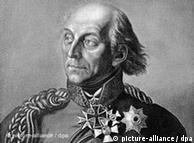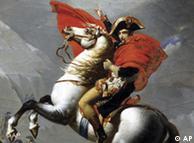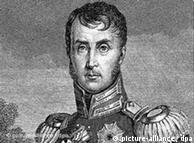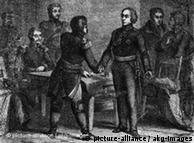History | 16.11.2009
The Convention of Tauroggen - January 3, 1813
In the letter, Ludwig York beseeched the king to seize the moment and build a coalition against the French Emperor Napoleon I (1769 - 1821). Napoleon had just suffered the first military defeat of his career in Russia.
 Bildunterschrift: Großansicht des Bildes mit der Bildunterschrift: Prussian General Hans David Ludwig Graf York von Wartenberg
Bildunterschrift: Großansicht des Bildes mit der Bildunterschrift: Prussian General Hans David Ludwig Graf York von Wartenberg
Prior to the letter's arrival, however, the general became embroiled in accusations of refusing to obey orders, after his 10th infantry had been forcibly recruited by Napoleon to become part of a massive army meant to bring Russia to its knees.
Together with the Russian czars, Napoleon had imposed a "continental ban" on England, with the aim of economically bleeding the island dry. But since Russia was dependent on English imports, Nicholas I circumvented the ban, prompting Napoleon to declare war on the last independent state on the European continent.
Napoleon's defeat
 Bildunterschrift: Großansicht des Bildes mit der Bildunterschrift: Napoleon Bonaparte
Bildunterschrift: Großansicht des Bildes mit der Bildunterschrift: Napoleon Bonaparte
The undertaking went terribly wrong. Napoleon's army of 600,000 soldiers were prepared for neither the bitter cold and massive distances, nor the military tactics of the Russians. At the crossing of the Berezina river, the French suffered a catastrophic defeat. Napoleon fled to Paris, and his grand army fell to pieces: only 90,000 soldiers made it back to Paris. The Prussian army general York spotted his chance. On December 30, 1812, he signed a truce with the Russian army in the Lithuanian city of Tauroggen. With that move, he was also guilty of refusing orders, because he was in violation of the Prussian king's commandment to obey the king of France.
After signing the Convention of Tauroggen, Ludwig York and Russian General Hans - Carl von Diebitsch - Sabalkanski (1785 - 1831) were isolated. Ludwig York was sure that the Prussian king would respond with drastic sanctions; he was, after all, known for his politics of fear with regard to Napoleon. He worried that his unauthorized decision could lead to a dishonorable discharge. Despite his concerns, he sat down at his desk to compose the now historic letter, which proposed forming a European alliance against Napoleon.
There had never been a better opportunity for Prussia and other European countries to emerge from under the rule of France, he wrote to Frederick William III. He respectfully requested the king to try to win other European powers on the side of a coalition against the French emperor. General York posted his letter on January 3, 1813. After some hesitation and against his will, Frederick William III acquiesced to York, and on March 17, 1813, he made his position public.
"To my people!"
 Bildunterschrift: Großansicht des Bildes mit der Bildunterschrift: King Frederick William III of Prussia
Bildunterschrift: Großansicht des Bildes mit der Bildunterschrift: King Frederick William III of Prussia
On this day, the king issued a proclamation in the newspaper Schlesischen Privilegierten Zeitung which began with the words: "To my people!" He called for popular support for the war against France he'd declared a day earlier. At the same time, he let it be known that he'd succeeded in forming an alliance with other European powers. Euphoria erupted across Prussia. Collections were held to gather money and valuables for the war effort. Particularly patriotic couples exchanged their gold wedding rings for rings made of iron, on which the words "I gave gold for iron - 1813" were engraved.
The decisive battle between the European allies and Napoleon was fought in Leipzig. From October 16 - 19, 1813, the French army faced off against a force made up of soldiers from Austria, Prussia, Russia and Sweden. In the end, the allies prevailed, ending France's dominance over Europe. The "freedom wars" ended at the start of 1815 when Napoleon, who'd ended his exile and returned to Paris, summoned the last of his power to challenge the European allies a final time. During the Battle of Waterloo, though, he once again suffered defeat, and went back into exile.
By this time a bitter - and, in his own words, misunderstood - man, Napoleon died on the British island of Saint Helena in the south Atlantic on May 5, 1821.
General Ludwig York was given various military awards and was named earl of Wartenburg. He died on April 19, 1830. He has lived on in the annals of history as a man who wrestled with his conscience, and in the end, made a courageous decision. It was a decision that could have cost him his career, but instead, led to the downfall of French hegemony on the European continent.
Author: Matthias von Hellfeld (dc)
Editor: Andreas Illmer

Comments